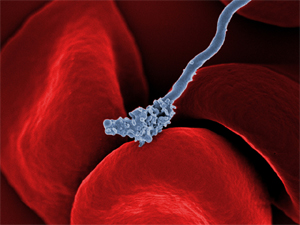



Date:16/05/18
 A tiny, cocaine-detecting chip could be the wave of the future when it comes to roadside drug tests.
A tiny, cocaine-detecting chip could be the wave of the future when it comes to roadside drug tests.
This month, a team of researchers at the University at Buffalo published a paper detailing a method of chemical testing that uses a light-trapping nanostructure to identify tiny samples of chemicals. And, though it’s been tested to target cocaine, scientists are optimistic it can be used with a wide array of other drugs in the future.
“Currently, there is a great demand for on-site drug testing,” said Qiaoqiang Gan, a Buffalo professor and one of the paper’s authors. “The high-performance chip we designed was able to detect cocaine within minutes in our experiments. It’s also inexpensive: It can be produced using raw materials that cost around 10 cents, and the fabrication techniques we used are also low-cost.”
Basically, the futuristic tech works by catching light at the edge of gold and silver nanoparticles. Those nanoparticles scatter the rays into specific recognizable patterns that are unique to specific substances. The technique of using “light-scatting signatures” to identify chemicals is known as surface-enhanced Raman spectroscopy, or SERS. That in and of itself isn’t new—but what’s new is Gan’s “high performance and low cost” chip.
“SERS holds a lot of promise for rapid detection of drugs and other chemicals, but the materials required to perform the sensing are usually quite expensive,” said Nan Zhang, another of the study’s authors. “The chips used for SERS are typically fabricated using expensive methods, such as lithography, which creates specific patterns on a metal substrate. We created our chip by depositing various thin layers of materials on a glass substrate, which is cost-effective and suitable for industrial-scale production.”
The chips last a long time, with a shelf life long enough to still work well after a year in storage. That’s in part because of a design that incorporates gold nanoparticles to help shield the silver from oxidizing.
To make the tiny chips practical for use, they’ll have to be installed in some sort of portable testing device. Then, police would be able to carry them around and use them to run blood and breath tests to check for the presence of cocaine or other drugs.
A 10-Cent Metal Chip May Be The Next Big Thing In Drug Testing
 A tiny, cocaine-detecting chip could be the wave of the future when it comes to roadside drug tests.
A tiny, cocaine-detecting chip could be the wave of the future when it comes to roadside drug tests.This month, a team of researchers at the University at Buffalo published a paper detailing a method of chemical testing that uses a light-trapping nanostructure to identify tiny samples of chemicals. And, though it’s been tested to target cocaine, scientists are optimistic it can be used with a wide array of other drugs in the future.
“Currently, there is a great demand for on-site drug testing,” said Qiaoqiang Gan, a Buffalo professor and one of the paper’s authors. “The high-performance chip we designed was able to detect cocaine within minutes in our experiments. It’s also inexpensive: It can be produced using raw materials that cost around 10 cents, and the fabrication techniques we used are also low-cost.”
Basically, the futuristic tech works by catching light at the edge of gold and silver nanoparticles. Those nanoparticles scatter the rays into specific recognizable patterns that are unique to specific substances. The technique of using “light-scatting signatures” to identify chemicals is known as surface-enhanced Raman spectroscopy, or SERS. That in and of itself isn’t new—but what’s new is Gan’s “high performance and low cost” chip.
“SERS holds a lot of promise for rapid detection of drugs and other chemicals, but the materials required to perform the sensing are usually quite expensive,” said Nan Zhang, another of the study’s authors. “The chips used for SERS are typically fabricated using expensive methods, such as lithography, which creates specific patterns on a metal substrate. We created our chip by depositing various thin layers of materials on a glass substrate, which is cost-effective and suitable for industrial-scale production.”
The chips last a long time, with a shelf life long enough to still work well after a year in storage. That’s in part because of a design that incorporates gold nanoparticles to help shield the silver from oxidizing.
To make the tiny chips practical for use, they’ll have to be installed in some sort of portable testing device. Then, police would be able to carry them around and use them to run blood and breath tests to check for the presence of cocaine or other drugs.
Views: 317
©ictnews.az. All rights reserved.Similar news
- Azerbaijani project to monitor disease via mobile phones
- Innovative educational system to be improved under presidential decree
- NTRC prolongs license of two TV and radio organizations for 6 years
- Azerbaijan establishes e-registry for medicines
- Azerbaijani museum introduces e-guide
- Nar Mobile opens “Nar Dunyasi” sales and service center in Siyazan city
- International conference on custom electronic services held in Baku
- OIC secretary general to attend COMSTECH meeting in Baku
- Azerbaijan develops earthquake warning system
- New law to regulate transition to digital broadcasting in Azerbaijan
- Azerbaijani State Social Protection Fund introduces electronic digital signature
- Intellectual traffic management system in Baku to be commissioned in December
- Tax Ministry of Azerbaijan started receiving video-addresses
- World Bank recommends Azerbaijan to speed up e-service introduction in real estate
- Azerbaijan to shift to electronic registration of real estate





















